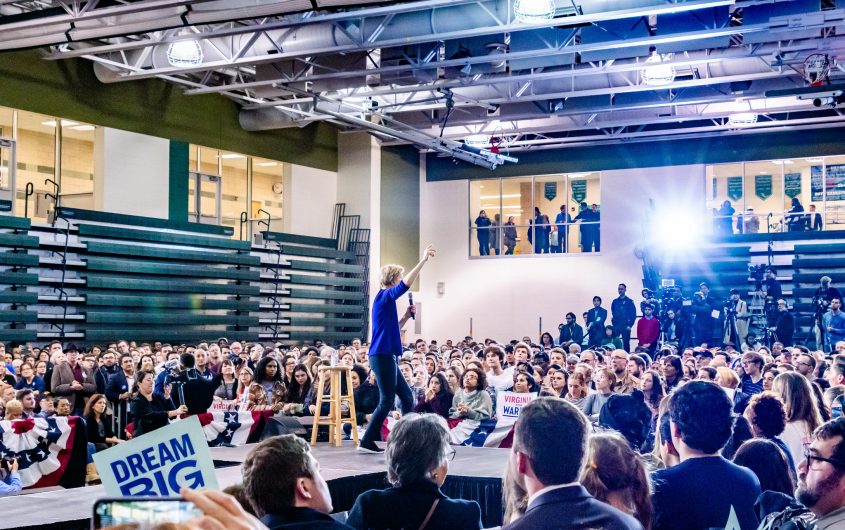
Hillel Steinberg via Flickr
Between German Pragmatism and “America First”: Democrats’ Foreign Policy in the 2020 Presidential Campaign

Caroline West
Research Intern
Caroline West is a research intern at AICGS for Spring 2020. She conducts research for staff and visiting fellows, writes media reports, manages the front desk, and helps organize and document events.
Caroline graduated from Johns Hopkins University in December 2019 with a Bachelor of Arts in International Studies and Sociology. While at Hopkins, her research concentrated on the impact of growing right-wing, anti-migrant movements on cultural and social integration initiatives in Germany. She is also interested in the obstacles to integration posed by ethnic and racial homogeneity, the persistence of the East-West divide in Germany, and how this divide is reflected in collective historical memory. She hopes to begin studying for a PhD in sociology in Fall 2021.
__
In the final weeks of 2019, The New York Times conducted video interviews with seven of the Democratic candidates for president, who were asked a series of questions on a wide range of topics, from the Hong Kong protests to vaping among teens in the United States. The fifth question asked each to name a foreign leader he or she particularly admired. Of the seven candidates interviewed, three spoke about German chancellor Angela Merkel. Tom Steyer lamented that she is now recognized, in place of the American president, as the “leader of the free world.” Senator Amy Klobuchar made reference to Merkel’s frequent status as the lone woman in gatherings of prominent world leaders, cheekily noting that Merkel could perhaps use a friend. Senator Elizabeth Warren praised Merkel’s courageous leadership in the face of growing turmoil over migration in Germany and throughout Europe.
We might take Democrats’ admiration of Merkel as a sign of the party’s commitment to develop a robust liberal alternative to President Trump’s so-called America First foreign policy.
We might take Democrats’ admiration of Merkel as a sign of the party’s commitment to develop a robust liberal alternative to President Trump’s so-called America First foreign policy. Merkel, after all, is herself a study in contrasts with the American president. While he favors brashness and bold action, Merkel is pragmatic to a fault. And while the Trump administration recently proposed spending $18 billion to fund its new Space Force, Merkel’s government has struggled to meet NATO commitments related to defense spending allocations. Such a decision is largely in keeping with the traditional standards of German foreign policy, which emphasizes the avoidance of war and a strong commitment to multilateral action and the furtherance of human rights as well as the prevention of genocide.
But though all Democratic candidates’ foreign policy platforms emphasize the importance of severing ties with autocrats and dictators and renewing America’s commitment to its multilateral memberships and longtime allies, none is completely divorced from the interventionism that has long characterized (to varying degrees) American foreign policy. The candidates are instead drifting toward putting a liberal veneer on politics-as-usual strategies that prioritize American dominance, if not hegemony. Warren’s platform calls for a reevaluation of the necessity of American military action, emphasizing her preference for “hard-nosed diplomacy.” She has committed to making deep cuts to defense spending, though without a complete overhaul of the military-industrial complex—the bloated permanent armaments industry and its affiliates in civil society and science that fuels American foreign policy. Klobuchar, in conversation with the Council on Foreign Relations, has lamented diminishing global trust in America’s leadership, noting that our allies once believed we led for the “benefit of all, not ourselves,” a characterization that mostly ignores America’s long history of self-interested foreign interventions.
Eisenhower called upon America to safeguard its commitment to democratic freedoms and open government, balancing our desire for security with unceasing recognition of the dangers posed by a technocratic elite exerting influence on public policy.
These stances are well-crafted and mostly thoughtful—and indeed, the campaigns behind these candidates likely see them as representative of the kind of balanced rhetoric that appeals to American voters scarred by Trump but not ready for revolution. But perhaps they should be considered in the face of then-president Dwight D. Eisenhower’s 1961 Farewell Address: his rallying cry against the military-industrial complex urged us to consider the “grave implications” of such outsized military spending and the extent to which it exploits “our toils, resources, and livelihoods.” Eisenhower called upon America to safeguard its commitment to democratic freedoms and open government, balancing our desire for security with unceasing recognition of the dangers posed by a technocratic elite exerting influence on public policy. This address is not a laundry list of policy suggestions, but a living manifesto with acute relevance in the age of Trump. Indeed, the defense industry has ballooned since the Eisenhower administration, expanding its reach to a host of private companies who act as “Walmarts of war” for the federal government.
In light of all this, Merkel’s politics of caution, imperfect though it may be, could be keenly attractive to an American public weary of endless war. Trump himself campaigned on a promise to put an end to such conflicts, though he has largely followed conventional Republican policy. It’s important to recognize, of course, that most voters are concentrated on domestic challenges at this stage of the primary season. Given that general lack of interest in foreign policy, candidates like Warren and Klobuchar may see little reason to develop their admiration for Merkel into a full-throated defense of her politics of restraint in military matters. But there is a danger that we are once again falling prey to the temptations Eisenhower warned against: the idea that there is some “spectacular and costly action” that could be the solution to the geopolitical challenges, such as rising far-right authoritarianism and Russian aggression, that we confront today. Democrats may seem restrained and reasoned in the liberal and leftist foreign policy strategies they propose, and it is unlikely that any of the candidates, if elected, would demonstrate the brazenly self-interested orientation of Trump. We should still examine their platforms with rigor, looking for those policies which, under the guise of multilateralism, continue to position global development, security, and equity as competitions America must win, rather than as imperfect goals to collectively strive toward.








